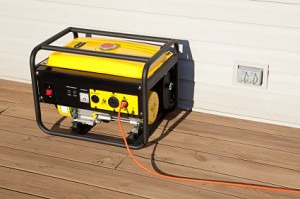Guide to Backup Generators

Emergency generators or backup generators are especially important when homes and businesses are located in areas prone to power outages due to hurricanes, tornadoes, ice storms or antiquated and overburdened power sources. In residences, a generator will power lights and prevent spoilage of food in freezers and refrigerators. Backup generators can also power garage door openers, Internet and phone services, a sump pump, septic system, water well and medical equipment such as respirators. The power output depends on the size of the generator. Here are a few things to consider when purchasing backup generators for residential purposes:
Permanent Installation
Resembling an air conditioner unit, permanent and weather-resistant generators are installed outside the home and are connected to a non-electrical grid power source, such as propane or natural gas. Some units are even compatible with alternative power sources like geothermal, solar and wind power.
An automatic transfer switch (ATS) starts the emergency generator and transfers power to your home as soon as a power outage occurs. Once grid power has been restored by the utility, the generator turns itself off. Since operation is automatic, these emergency generators will operate even when you are away from home. These backup generators are also significantly quieter to operate than portable generators. The biggest disadvantage to a permanently installed generator is that it is more expensive than a portable unit.
Portable Units
Portable generators are not hard-wired to the home, but are able to be attached to a home’s individual electrical appliances or via a properly installed manual transfer switch. The manual transfer switch will provide power to all appliances and fixtures plugged into that switch’s circuit(s). They all require a manual start.
Portable backup generators are best for consumers with a limited budget and are available at many home improvement stores. Usually powered by gasoline, they typically provide between 2,000 and 4,000 watts of power for units connecting with an extension cord. For larger units, 4,000 to 12,000 watts of power is provided through a home transfer switch. To ensure safe operation, hire a licensed electrician near you to install this switch.
Somewhat heavy, portable generators can be cumbersome to move around, and fuel must be carefully stored to prevent fires. Many of the commercially available units are started by pulling on a cord. Other disadvantages include noisy operation and their susceptibility to theft, since they are not permanently installed.
Size of Generator
Because every home is different and no two families use the same appliances, there are online resources to help you choose the generator that will best serve your needs. Avoid buying a generator that is much too large or one that is too small. Do a little research or hire a pro to help you buy the size that is right for your home. Gillette Generators, Kohler Residential Power and other Web sites provide charts to help you make your decision.
Backup generators offer peace of mind for people who live in remote areas or areas susceptible to power outages. By weighing the advantages and disadvantages of permanently installed and portable generators, you can choose the type and size that meet your needs.
Looking for a Pro? Call us (866) 441-6648

Electrical Average Costs
Electricians Experiences

Electrician Restarted The Lights In My Outdoor Kitchen

Parking Lot Lights Restored So Employees Can Reach Cars Safely



